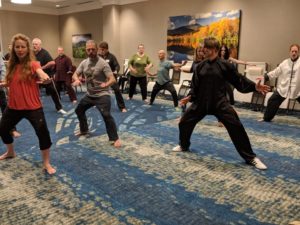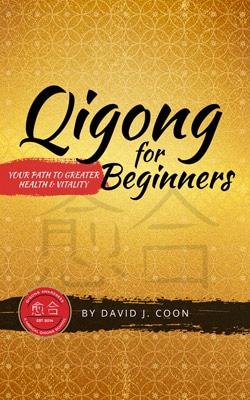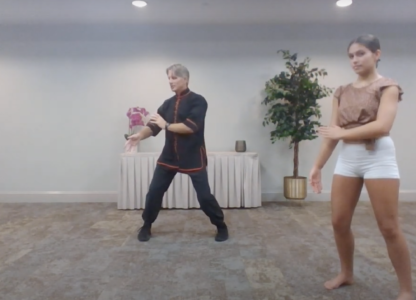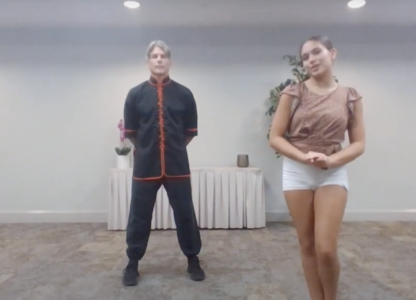Thinking of taking a Qigong or Tai Chi Class?
Thinking of taking up a Qigong practice? Wishing you could go out to the local park and take up a class? These days it is more likely that you will find a Qigong class online. How and where should you begin? Qigong (pronounced chee gong or chee gung). Essentially means the cultivation or harnessing of Universal Life Force or Qi pronounced (chee). Qigong sometimes referred to as Chinese Yoga, has many similarities to Yoga from India. Unlike some popular yoga styles, most Qigong styles do not focus upon deep stretching to Yoga’s degree. This makes it easier to practice for the average person, including those with physical challenges, injuries, and older adults.
Tai Chi is the most popular form or style of Qigong around the world, and it is also considered by some to be a Martial Art. Most practitioners of Tai Chi focus only on the movements of Tai Chi for cultivating health and vitality. Some Tai Chi practitioners also focus upon the Martial Arts applications. Although Tai Chi is a Qigong style, it is practiced in specific forms or sets similar to a martial arts form from Karate, for example. Unlike Karate, Tai Chi is the slow-moving practice of mindfulness. In Tai Chi, rather than emphasizing the more linear and hard movements of Karate, Tai Chi uses more circular and much softer movements.
Medical Qigong is a form of Traditional Chinese Medicine
There are many new forms of Qigong coming forth to the United States and showing up around the world more and more every day. These styles and methods of Qigong are less widely known by the public. One of these forms of Qigong is called Medical Qigong, and it is considered the Father of Acupuncture, and it is very steeped in Traditional Chinese Medicine. Medical Qigong is a style of Qigong like Kung Fu is a style of Martial Arts. Medical Qigong was formed about 2,500 years ago by physicians in China, so Medical Qigong is at the very roots of Traditional Chinese Medicine (TCM). It is, in fact, one of the four main branches of TCM. The other branches include Acupuncture, Herbs, and Massage.
When seeking out Qigong training, I recommend finding a teacher who you resonate with and who teaches classes that you enjoy. That, to me anyway, should be number one. Credentials of Qigong teachers and Martial Arts masters etc., should be at best a secondary contemplation. I personally think it is cool to know who your teacher studied with and what their lineage is, and this can also help you determine if you vibe with that style and that lineage because there are so many different styles and different teachers of different styles you will need to find the best teacher and best style for you.
My Qigong Experience
The great news is that there is a lot to learn because there is so much to choose from! I personally became involved in Martial Arts and Traditional Chinese Medicine at about fifteen years old. I was an athlete on the injured list due to an accident that left me with a debilitating spinal disease called scoliosis. Over the next ten years of my life, I trained in Martial Arts, Qigong practices, Yogic Breathing practices, and studying eastern and western psychology and philosophy. Over the next ten years, my spine continued to degenerate even though I was involved in many of these practices. When I was twenty-five years old, the doctors told me my spine looked like I was eighty-five years old. I was in a lot of pain, and the doctors said my spine was filled with arthritis.
I deepened all of the most subtle breathing and movement practices over the following three years, deepening my practices of Medical Qigong. I also deepened the healing work I was doing with skilled practitioners. I had a series of energetic awakenings during this approximately three-year period that caused energy (Chi) to surge through my body. I experienced physical, emotional, and energetic catharsis. It was painful but amazing! My heart chakra began to whirl as I had never before experienced. I didn’t really know I had a heart chakra until that moment. My mind was filled with emerald greens and yellows. These are the colors of the third and fourth chakras. This experience not only healed my spine but has radically transformed my life.
Qigong and The Force
I can personally attest to there being something – some kind of phenomena with these Qigong practices. Perhaps maybe the same phenomena that Yoda called the Force in Star Wars. Maybe George Lucas, the creator of Star Wars, pulled some of his ideas from these ancient traditions. Unlike Tai Chi, Medical Qigong is not at all based on martial art or martial art movements. It emphasizes instead working specifically with different organs, acupuncture meridians, breathing in specific ways, and more. Unlike Tai Chi, where you might have a form with 24 postures, for example, a Medical Qigong routine might consist of 8 or twelve key movements to bring about a greater flow of energy to certain areas of the mind-body-spirit. Medical Qigong flows might also target particular conditions such as high blood pressure, for example. In this way, Medical Qigong is given as prescriptive exercises in China at their hospitals. Those of us trained in Traditional Chinese Medicine may also offer these prescriptive exercises to our Medical Qigong, Acupuncture, or Massage clients.
We will be teaching a few Five Hour Medical Qigong CEU Programs this year. The first topic will be related specifically to reducing stress and anxiety.
Author: David J. Coon
Medical Qigong Master









